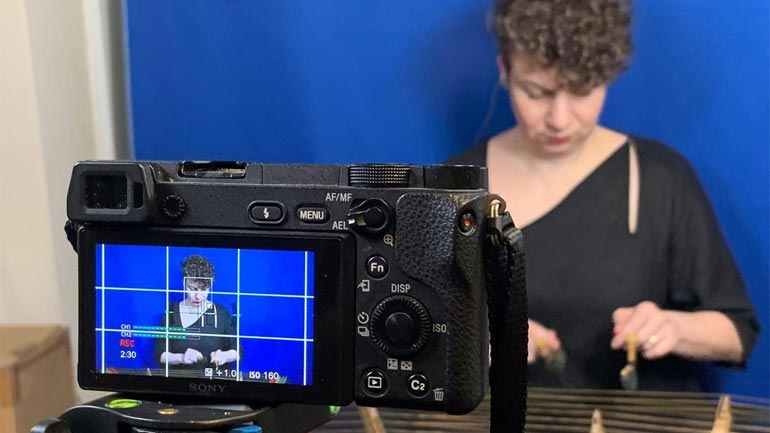
When it comes to improving your sound and your recordings, there is nothing more important than a MIDI controller. In many ways, this piece of equipment can transform the sounds you create and the depths you are able to produce in your records. And they don’t have to break the bank!
That being said, it can be hard to keep up with the latest MIDI controllers and knowing what setup is right for you. From how these pieces of equipment work, to signs you need to have one and where you should purchase one from, keep reading to learn everything you need to know before purchasing a MIDI controller.
1. What is a MIDI controller, and how does it work?
MIDI is short for Musical Instrument Digital Interface, and it is a type of equipment that enables computers, musical instruments, and other hardware to communicate.
A MIDI controller produces and transmits the MIDI data to MIDI-enabled devices. For example, if you are using a MIDI keyboard, when you press a key, it creates a MIDI message that is then transmitted to the device connected by either USB or a MIDI cable.
Each of the channels on a MIDI controller can be utilized to manage a unique device and can be allocated its own instrument. Therefore, if you have a MIDI controller with 12 channels, you can connect 12 different instruments. Keep in mind that MIDI only transmits information, not audio signals, so a MIDI controller has to have an onboard sound source (such as a synth or sampler) to produce noise.
2. Are there different types of MIDI controllers?
Just as with all pieces of musical equipment, there are a variety of different MIDI controller models on the market. On one end of the spectrum, you have basic models that only include vital functions such as record, stop, and play buttons. On the other hand, more complicated models have an abundance of features.
MIDI controllers are a particular type of MIDI interface that has built-in input methods such as piano keys, knobs, sliders, and pressure-sensitive pads. Usually, these controllers are ideal for pairing with external MIDI gear such as hardware synths and drum machines. Some options even will accommodate everything in your studio.
The keyboard is another popular type of MIDI controller, and these can have several keys that range from a single octave to the full piano range of 88 keys. Moreover, some varieties of MIDI keyboards have extra programmable pads, encoders, and faders, which allows for greater functionality. The controller that is right for you depends upon your use and performance specifications.
In most cases, your MIDI controller will be able to connect to your computer via USB. Depending on the type, you may be required to install specialty software before you can join the controller. You may also need 5-pin DIN cables for connecting with your digital music gear.
3. What are some popular MIDI setups?
While there is a wide array of ways to use your MIDI controller, there are some popular setups that musicians around the world like to utilize. These include:
- DAW and MIDI Controller: a simple setup that is light and useful for composing all genres of music.
- Computer, MIDI Interface, and Synthesizers: the MIDI interface does the conversions which allow the DAW sequencer to control the hardware synthesizers and operate as the central hub for transmitting the MIDI information
- Hardware Sequencer, Drum Machine, and Synthesizer: a non-computer-centric setup with the hardware sequencer for the DAW’s MIDI editing features.
4. How do I know if I need a MIDI controller?
If you are looking to take your musical recordings to the next level, you will want to purchase a MIDI controller. As it allows you to control recording, playback, and other options, it means that you can uniquely create your music.
So, if you want more control over the editing and composing process, you will want a MIDI controller. For example, this piece of equipment enables you to add sound effects or modulations, connect multiple instruments, and add more personality and complexity to every recording.
That being said, the top MIDI controllers also help to make composing and recording music a lot easier. With your MIDI controller, you can efficiently cut performances note by note, adjust their flow or tempo, or replace sounds. This equipment can be used to automate parameters or modify pieces on instruments or effects.
Despite everything it can do, this type of equipment is usually easy to set up and affordable. For this reason, it is highly recommended that you opt to use one of these rather than a standard keyboard, as they are harder to use with your music program.
5. Where should I buy a MIDI controller from?
If you are looking to purchase a MIDI controller for your home studio, you will want to ensure you are buying one from a reputable seller. Before making your purchase, make sure to do your research so that you know the type of MIDI controller you are looking for and what your budget is to spend on this piece of equipment.
That being said, it is always suggested that you reach out and speak to someone with experience with these controllers. Whether that is a friend who has been using one for years or a sales assistant at your favorite online music store, these people have the knowledge to ensure you make the right choice for you.
To ensure you are getting the best deal, make sure to check out MusicMajlis deals and promotions as they often have great prices on high-quality MIDI controllers.
Are you considering adding a MIDI controller to your collection soon? Why or why not? If you already own one, what do you think the most significant benefits are? What would you tell someone who’s still on the fence about purchasing one?
Let us know your thoughts and any relevant experiences in the comments below!




